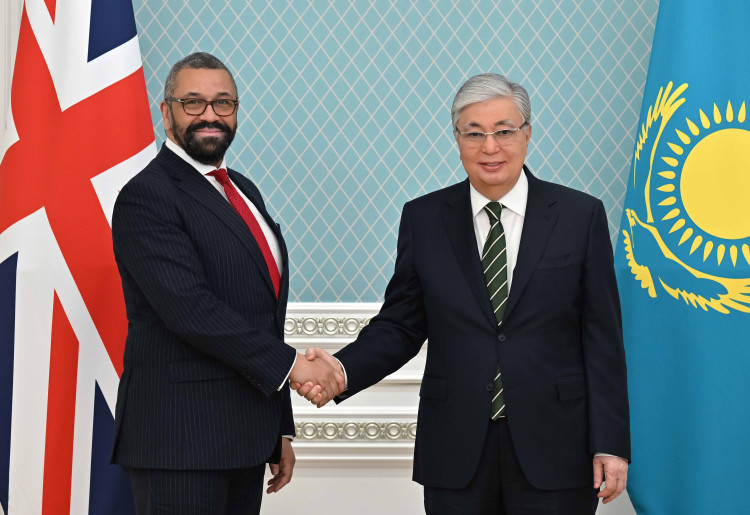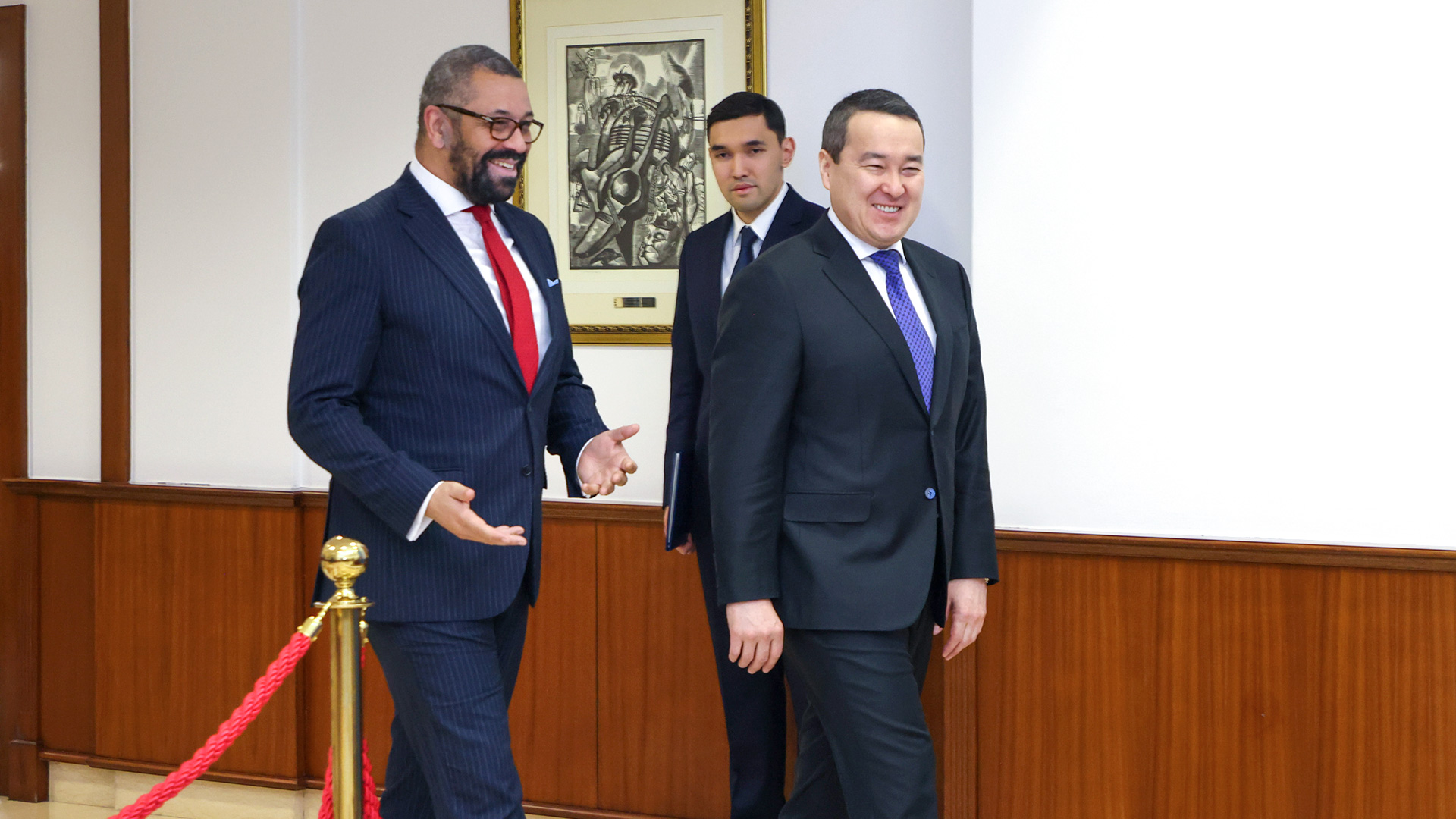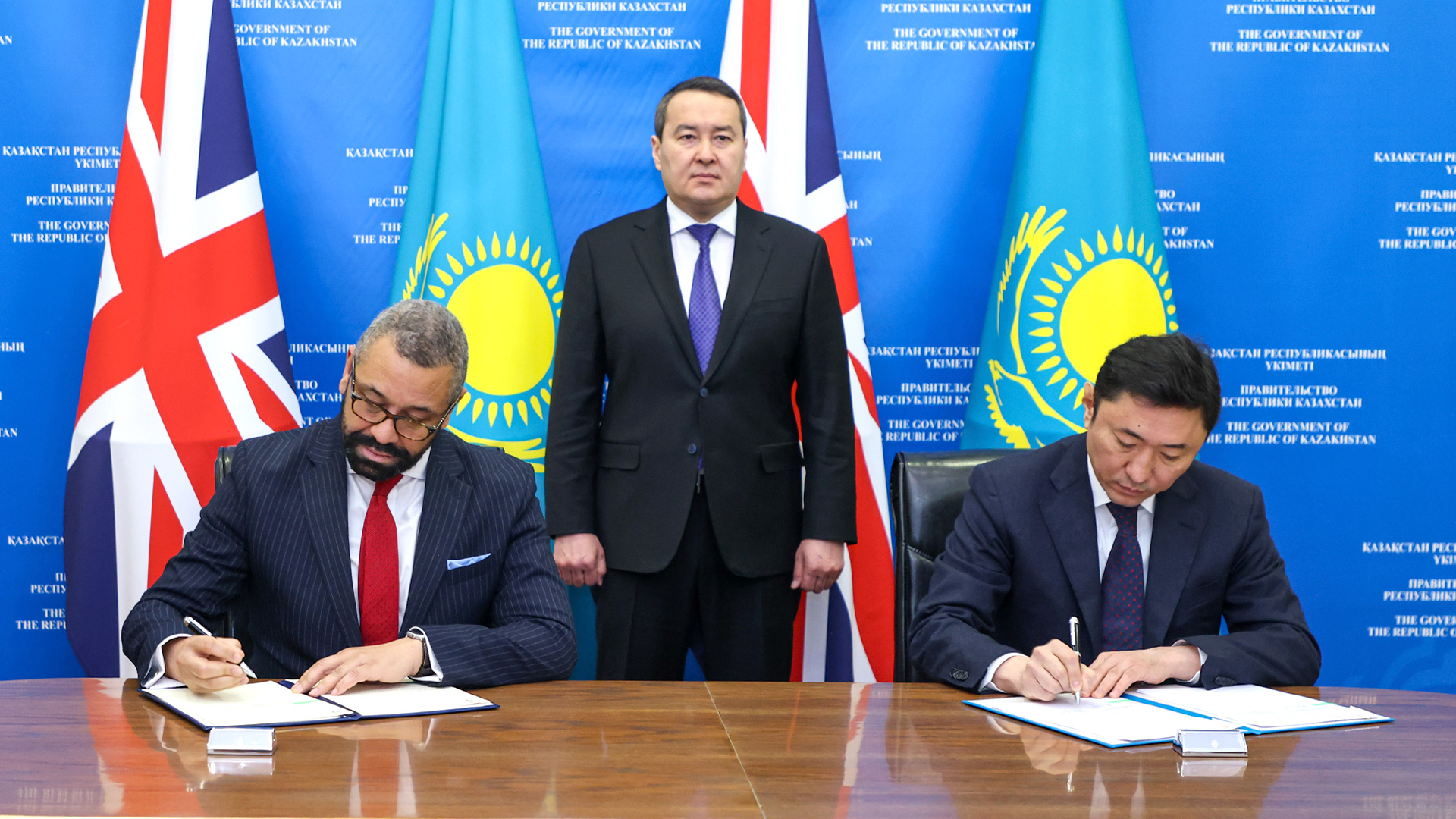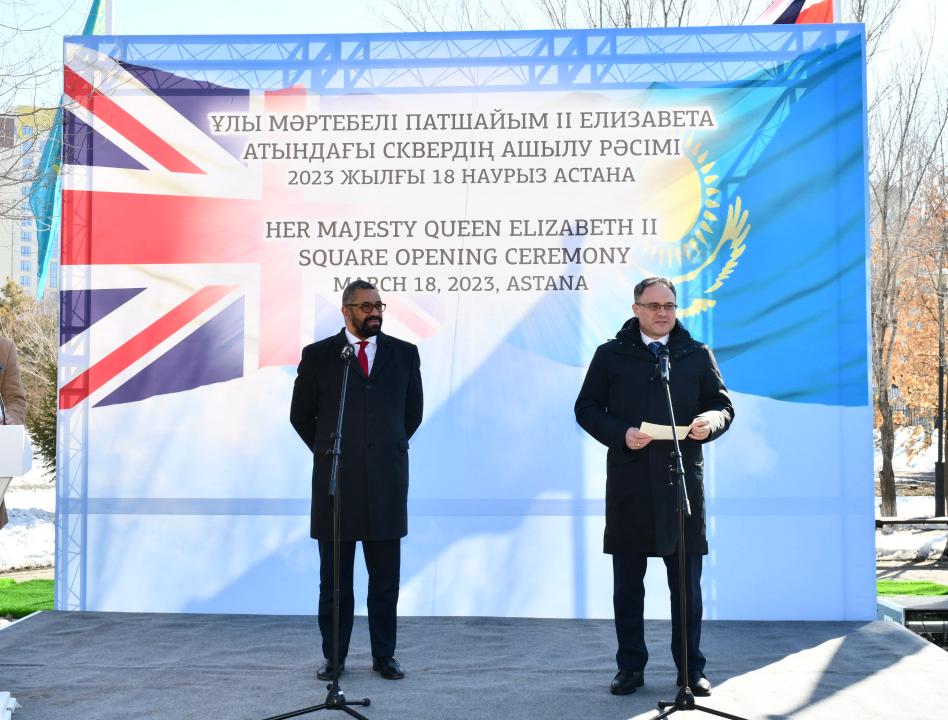ASTANA – Kazakhstan is the United Kingdom’s primary trading partner in Central Asia, Secretary of State for Foreign, Commonwealth and Development Affairs of the UK James Cleverly said during his meeting with President Kassym-Jomart Tokayev in Astana as part of his first visit to the nation on March 18.

UK Foreign Secretary James Cleverly and President Kassym-Jomart Tokayev meet in Astana on March 18. Photo credit: Akorda.
According to the President’s press office, Tokayev and Cleverly spoke about strengthening bilateral cooperation in political, trade, economic, investment, and humanitarian fields.
“Your visit will give a very strong impetus to further enhance mutual cooperation between Kazakhstan and the UK. I took note of your recent speech at the Foreign Commonwealth and Development Office that outlined the long-term vision for British foreign policy. Indeed, it is a very important speech,” Tokayev said.
The Kazakh President expressed appreciation for the positive dynamics of relations with the UK. “I would like to assess our mutual cooperation as very successful, particularly, in the economic sphere and the political domain. We need to make additional efforts to push forward this very positive direction in our mutual cooperation”, he added.

UK Foreign Secretary James Cleverly and Prime Minister Alikhan Smailov. Photo credit: Prime Minister’s office.
Cleverly noted the excellent relations between Astana and London. He said the UK positively assesses the political reforms in Kazakhstan.
“We are finding good opportunities to work together on the economic growth plans that you have. And the regulatory and tax reform agenda that you have put in place is one that I think will help boost our economic relationship,” Cleverly said.
He also held a meeting with Kazakh Prime Minister Alikhan Smailov, during which he noted that the UK is committed to strengthening cooperation in all mutually beneficial directions.
“Britain and Kazakhstan have an excellent relationship, it is quite strong and, in my opinion, has great growth potential. This gives us the opportunity to discuss what else we can do, what prospects there are for the future,” Cleverly said.

UK Foreign Secretary James Cleverly and Minister of Energy Bolat Akchulakov sign memorandum on strategic partnership between Kazakhstan and the United Kingdom in the presence of the Prime Minister in Astana on March 18.
The Prime Minister’s office reported that trade turnover between Kazakhstan and the UK increased by approximately 60 percent last year and exceeded $1.8 billion. In addition, the UK is one of the top 10 investors in Kazakhstan, contributing $16.5 billion since 2005.
“The Kazakh government is determined to further deepen cooperation with the UK in all directions. In this context, an important step will be the signing of the bilateral Strategic Partnership and Cooperation Agreement, the development of which is being finalized,” Smailov said.
The Kazakh Prime Minister also announced plans to increase exports to the UK of more than 100 goods worth approximately $800 million. Areas of potential future investment includethe production of green hydrogen, projects in the logistics sector, and the development of the Trans-Caspian International Transport Route.
Cleverly and Deputy Foreign Minister Roman Vassilenko took part in opening a city square in honor of Queen Elizabeth II. The square is located on Kabanbay Batyr Avenue in the Central Park of Astana.

UK Foreign Secretary and Deputy Foreign Minister Roman Vassilenko took part in opening a city square in honor of Queen Elizabeth II in Astana. Photo credit: Mfa.gov.kz.
“Queen Elizabeth II enjoyed the love and respect of the Kazakh people and nations worldwide. It was President Tokayev’s decision to give the name of Her Majesty to one of the squares in the city and mark the Queen’s platinum jubilee. Unfortunately, Queen Elizabeth II did not pay a visit to Kazakhstan, but we hope that King Charles III and other members of the royal family will visit our country,” Vassilenko said at the ceremony.
Several bilateral documents were signed as part of the UK Foreign Secretary’s visit. They include memoranda of understanding on a strategic partnership in the fields of critical minerals and green hydrogen.
The UK Foreign Secretary also met with Aset Irgaliyev, Chairman of the Agency for Strategic Planning and Reforms, to sign a memorandum of understanding as Kazakhstan joined the Effective Governance for Economic Development (EGED) program in Central Asia.
The EGED program is funded by the UK government and is implemented by the World Bank and Agency for Technical Cooperation and Development. It was launched in 2020 and aims to improve the effectiveness, accountability and transparency of economic policies in Kyrgyzstan, Tajikistan and Uzbekistan.
This program is now being expanded to Kazakhstan with a focus on sharing expertise and strengthening capability across the region.
“The partnership gives us more flexibility and independence now. We also have an opportunity to implement these evidence-based reforms, and to push our internal agenda for the internal transformation of official statistics,” Zhandos Shaimardanov, head of the Bureau of National Statistics, which is a part of the Agency for Strategic Planning, told The Astana Times.
As a major provider of official statistics, the Bureau’s mission is to ensure the trust of all the users in the country, especially those from civil society. “It is important not only to provide reliable data, but also to ensure that it is eventually used, especially in the decision-making process,” Shaimardanov added.
The Foreign Secretary also met Vera Voronova, the Chief Executive of the Association for the Conservation of Biodiversity of Kazakhstan (ACBK). Voronova outlined one of the great biodiversity success stories of Kazakhstan – the restoration of the saiga antelope population from around 20,000 in 2005 to over 1.3 million. The Altyn Dala Initiative, recognised by the UN last year as one of the world’s top ten Biodiversity Restoration projects, was founded by the ACBK and the UK’s Royal Society for the Protection of Birds (RSPB), with the support of the Kazakh Government and some international organisations. Kazakhstan has recently joined two significant international biodiversity initiatives – it has the potential to play an important role as the guardian of its vast, and unique, steppe ecosystem.
The Foreign Secretary’s program also included the meeting with representatives of civil society, higher education, as well as Bolashak and Chevening alumni. Opinions were shared on how to strengthen and support the ongoing political and rule of law reforms in the country. The Foreign Secretary said that these sectors will play a key role in building a fair and prosperous Kazakhstan during the next 30 years.
Some 550 companies, joint ventures, and representative offices with British capital operate in Kazakhstan. The country also hosts a branch of De Montfort University and plans to open a branch of Heriot-Watt University.
